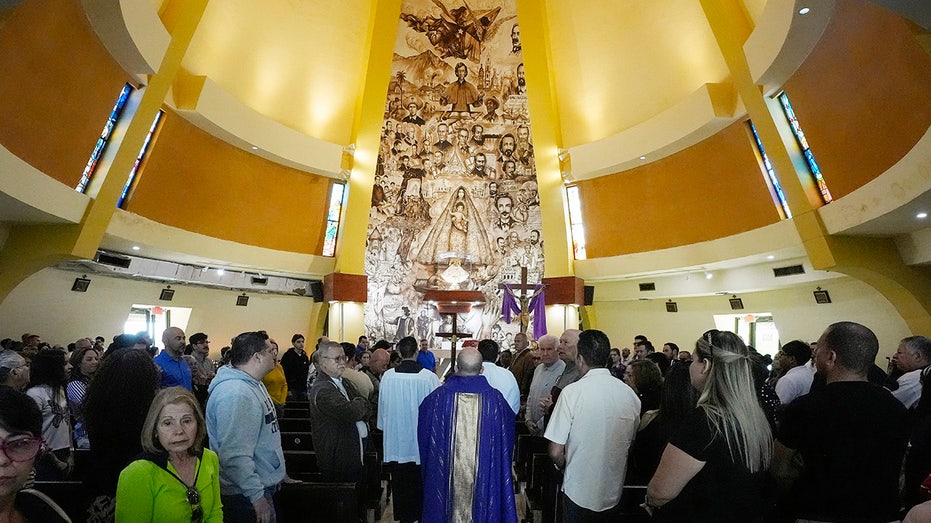Miraculous origins of the Virgin of Charity of Cobre, beloved by Cubans around the world
The story of the Virgin of Charity of Cobre is filled with mystery and purportedly miraculous details. Here's how Our Lady of Charity came to be the patron saint of Cuba.

A small statue of the Virgin Mary with purportedly miraculous origins has served as a national symbol of Cuba and those of Cuban descent for the past four centuries — and is the patron saint of the country.
The story of the Virgin of Cobre, also known as "Our Lady of Charity," "Our Lady of Caridad," and "Cachita," dates back to the early 17th century, the Associated Press said.
Three men — two Indigenous brothers, Juan and Rodrigo de Hoyos, plus an enslaved African boy, Juan Moreno — set sail from Cobre, a settlement in eastern Cuba, hoping to find salt.
‘MOTHERING SUNDAY’: THE LENTEN CONNECTION TO MOTHER'S DAY
Instead of salt, the men found something else.
After a storm, the three men came across a relatively small (35 centimeter) statue of the Virgin Mary carrying a figure of the infant Jesus, floating on top of a wooden board in the Bay of Nipe, the AP reported.
Even stranger: Neither the statue nor its clothes were wet, even though they were found floating in the sea after a rainstorm.
Written on the board was the message, "Yo Soy la Vírgen de la Caridad," meaning "I am the Virgin of Charity."
The three picked up the statue and brought it to their village, Barajagua, said Dr. Geraldine M. Rohling, archivist-curator emerita at the Basilica of the National Shrine of the Immaculate Conception in Washington, D.C., in information provided to Fox News Digital.
The Basilica of the National Shrine of the Immaculate Conception has an "Our Lady of Charity Oratory," featuring a marble statue of Our Lady of Charity.
The statue was "a gift of Cuban American Catholics," said Rohling.
Eventually, the original statue of Our Lady of Charity was brought to the parish church in Cobre, where a series of mysterious events reportedly occurred.
"Reports stated that the statue often mysteriously disappeared to a spot in the Cobre Mountains," said Rohling.
"One night, the villagers noticed a great light in the mountains. There, they found the statue."
In response, the villagers built a hermitage at that location — and the statue has stayed there ever since, she said.
Now, that spot is known as the National Sanctuary of Cuba. Thousands of people, including celebrities, visit each year, the AP said. The people who arrive seek blessings or healings, or they bring offerings.
"Baseball players and Olympic champions have left their colorful jerseys and shiny medals," the AP noted, and author Ernest Hemingway "requested that his 1954 Nobel Prize be placed at the statue’s feet as a gesture of thanks to Cuban people for inspiring works like ‘The Old Man and the Sea.’"
Additionally, people who attribute their healing to the intercession of Our Lady of Charity leave their now-unnecessary medical devices at the sanctuary, said the AP.
TEXAS TODDLER'S SWEET INTERACTION WITH VIRGIN MARY AND BABY JESUS NATIVITY GOES VIRAL
In the centuries following the discovery of the statue, Our Lady of Charity has played an important role in the Cuban psyche.
In the last half of the 19th century, when Cuba fought a series of wars for independence from Spain, injured soldiers would ask the virgin to be healed and would sew her image on their uniforms, the AP noted.
Following Cuba's independence in 1902, Cuban bishops and ordinary Cubans requested that Our Lady of Charity be named the patroness of Cuba, said Rohling.
That request was granted on May 10, 1916, in a proclamation by Pope Benedict XV, she said.
So Our Lady of Charity is the patron saint of Cuba.
VIRGIN MARY STATUE REPORTEDLY CRYING IN MEXICO TOWN SPARKS QUESTIONS ABOUT POTENTIAL MIRACLE
Later in the 20th century, as Cubans fled due to the rise of communism, Our Lady of Charity took on a new role as a symbol of pride for those of Cuban descent.
The National Shrine of Our Lady of Charity, also known as La Ermita de la Caridad, was established in Miami in the late 1960s, giving those devoted to Cachita a place to venerate the saint in the United States.
On Sept. 8, 1961, the Feast of the Nativity of the Blessed Virgin Mary, "the blessed image of the Our Lady of Charity venerated at the shrine arrived in Miami," says the website for the National Shrine of Our Lady of Charity.
That statue, said the shrine, came from a parish in Havana.
CLICK HERE TO SIGN UP FOR OUR LIFESTYLE NEWSLETTER
"The night of its arrival, the statue presided over the Mass that was celebrated in her honor at Miami Stadium before 30,000 Cubans exiled," the shrine also said.
Exactly five years later, Archbishop Coleman F. Carroll of the Archdiocese of Miami stated his support for the construction of a shrine in Miami to honor Our Lady of Charity.
"Today, the Diocese of Miami exhorts all Cuban artists, architects, sculptors, painters and craftsmen to give their talent and time in order to achieve this goal," he said. (The Diocese of Miami was elevated to "archdiocese" in 1968.)
Construction of the shrine began the following year, and it was dedicated in 1973.
In 2000, La Ermita de la Caridad was declared the National Shrine of Our Lady of Charity by the United States Conference of Catholic Bishops.
Devotion to Our Lady of Charity is not limited to Catholic Cubans, said the Associated Press.
The website of the national shrine states, "La Ermita is home to all of Mary’s children, without distinction of sex, race or religion, whom she waits for every day to welcome them under her mantle of maternal love, the mantle of the Virgin of Charity."
Cubans who practice Santeria, an African Cuban religion, refer to Our Lady of Charity as "Ochun," a goddess of female sensuality and maternity, said the Associated Press.
"Worshipers often wear yellow, a color associated with Ochun, and leave offerings of sunflowers," the AP noted.
The Associated Press contributed reporting.
For more Lifestyle articles, visit www.foxnews.com/lifestyle.


